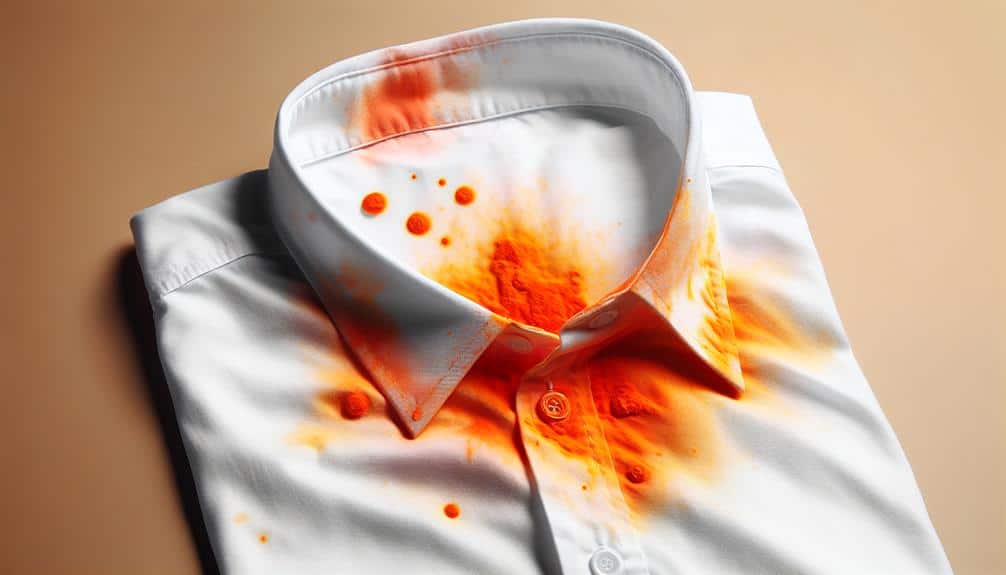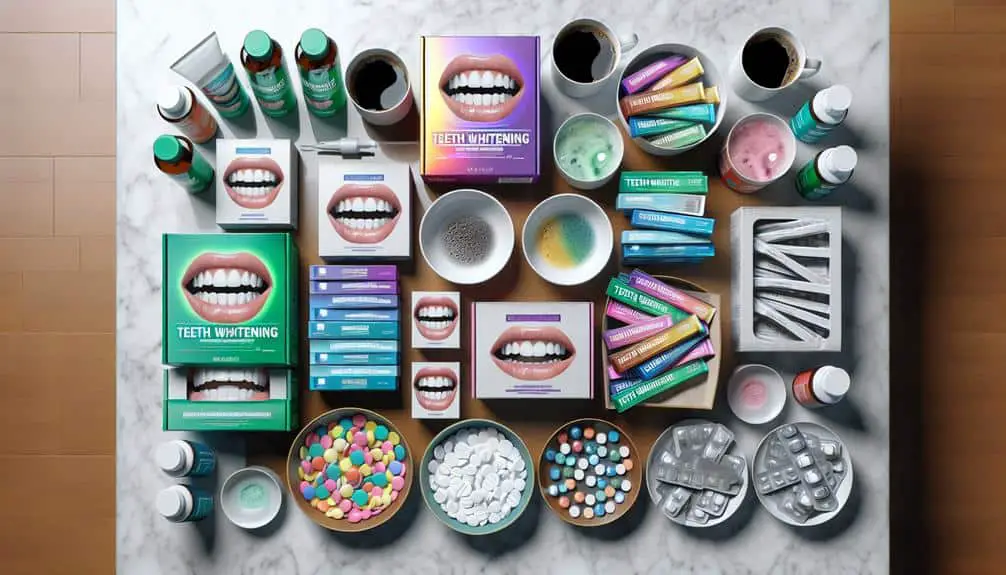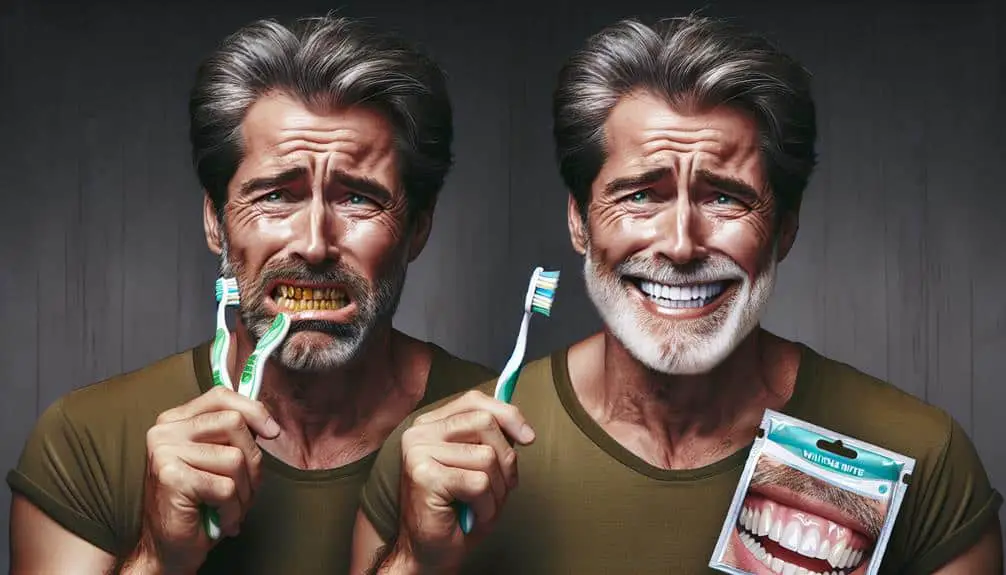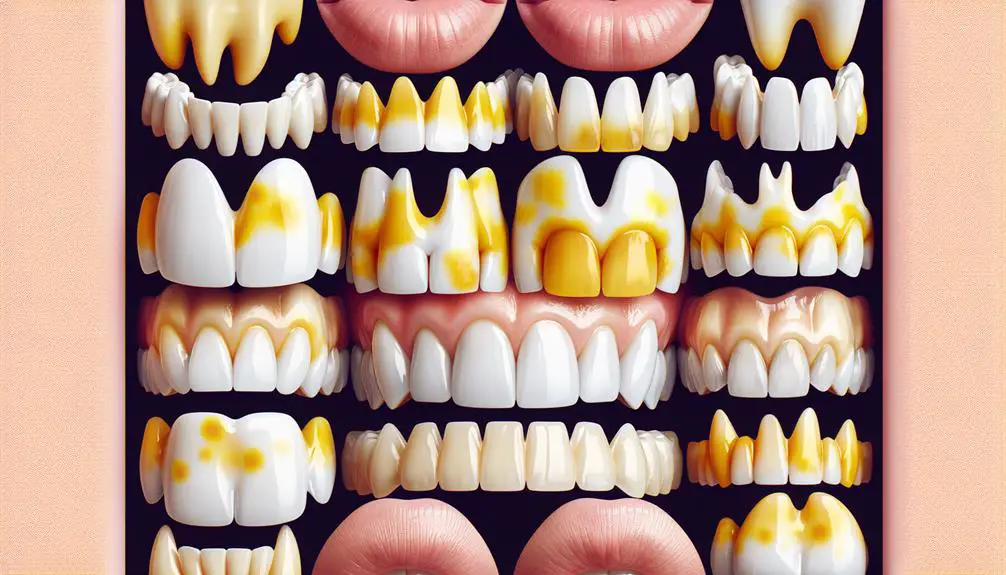Medication stains on your teeth demand special whitening treatments because they are tough to remove. These stains go deep, needing powerful agents to break them down effectively. Standard methods may not cut it. Professional whitening by experienced dentists can target and eliminate these stubborn discolorations. They have the expertise and tools to restore your natural tooth color successfully. Keep in mind, understanding the causes and essential methods is vital for your oral health. Specialized whitening treatment can offer you a brighter smile.
Key Points
- Medication stains interact with enamel, requiring stronger whitening agents.
- Standard whitening may not effectively remove deeply embedded medication stains.
- Specialized whitening procedures target and break down stubborn medication stains.
- Professional whitening is tailored to safely and effectively restore natural tooth color.
- Consulting a dental professional experienced in treating medication stains is crucial.
Understanding Medication Stains and Teeth
Understanding medication stains on teeth is essential for exploring effective whitening treatments. These stains are primarily caused by certain medications, such as tetracycline antibiotics, antihistamines, and high blood pressure medications. The discoloration occurs when these medications interact with the enamel, leading to a yellow or gray hue on the teeth.
Prevention of medication stains can be challenging, especially when these medications are necessary for health reasons. However, consulting with your healthcare provider about the potential side effects on teeth before starting a medication regimen is vital. Additionally, practicing good oral hygiene, including regular brushing, flossing, and dental check-ups, can help minimize the severity of staining.
Understanding the causes of medication stains and implementing preventive measures can aid in managing and potentially reducing the discoloration on your teeth. By being proactive and informed, you can take steps to maintain a bright and healthy smile despite the challenges posed by certain medications.
Special Considerations for Whitening Medication Stains
To effectively address medication stains on your teeth, it's essential to explore specialized whitening treatments tailored specifically for this type of discoloration. Tooth discoloration caused by medications presents unique challenges due to the nature of the stains. Unlike surface stains from food or drinks, medication stains tend to be more stubborn and deeply embedded in the enamel.
When it comes to stain removal, especially for medication-induced discoloration, standard whitening treatments may not be sufficient. Special considerations must be taken into account to guarantee effective results without causing damage to the teeth. Professional whitening procedures that are specifically designed for medication stains often involve stronger whitening agents or techniques to penetrate and break down the stubborn stains.
It is vital to consult with a dental professional who's experience in treating medication stains to determine the most suitable whitening treatment for your specific case. By addressing medication stains with specialized whitening approaches, you can effectively restore the natural color of your teeth and achieve a brighter, healthier smile.
Safe Whitening Methods for Medication Stains
When considering whitening methods for medication stains on your teeth, it's important to prioritize safety and effectiveness. Natural remedies can be a gentle yet effective way to combat medication stains. For instance, baking soda mixed with hydrogen peroxide can act as a natural whitening agent. DIY solutions like oil pulling with coconut oil or using activated charcoal can also help in reducing medication stains on your teeth. These methods are generally safe and can be easily incorporated into your oral care routine.
However, it's crucial to bear in mind that natural remedies may take longer to show noticeable results compared to professional treatments.
Before trying any whitening method, it's advisable to consult with your dentist to ensure it's safe for your specific oral health needs. Additionally, maintaining good oral hygiene practices such as regular brushing, flossing, and dental check-ups can also aid in preventing and reducing medication stains on your teeth.
Professional Whitening Options for Medication Stains
For effective and lasting results in whitening medication stains on your teeth, professional whitening options offer a safe and efficient solution. When dealing with medication stains, it's essential to contemplate cosmetic dentistry procedures that are tailored to address these specific challenges. Professional whitening alternatives provided by experienced dentists can effectively target and lighten medication stains, restoring the natural brightness of your smile.
Cosmetic dentistry treatments such as in-office whitening sessions or custom take-home whitening kits can greatly enhance the appearance of teeth affected by medication stains. These options are designed to penetrate deep into the enamel, breaking down stubborn stains caused by medications and enhancing the overall whiteness of your teeth. Unlike over-the-counter products, professional whitening treatments are carefully formulated to be gentle yet powerful, ensuring that your teeth are whitened safely and effectively.
Tips for Maintaining a Bright Smile
Maintaining a bright smile requires consistent oral hygiene practices and regular dental check-ups. To help you keep your smile radiant, here are some essential tips to incorporate into your daily routine:
- Daily Care:
Brush your teeth at least twice a day for two minutes each time, using fluoride toothpaste. Don't forget to floss daily to remove plaque and food particles that brushing alone can't reach.
- Diet Adjustments:
Limit sugary and acidic foods and beverages that can erode enamel and lead to staining. Opt for tooth-friendly foods like crunchy fruits and vegetables that can help clean your teeth naturally.
- Regular Dental Check-ups:
Visit your dentist every six months for professional cleanings and check-ups to catch any issues early and maintain a healthy smile. Listen to your dentist's advice on personalized care tailored to your oral health needs.
Frequently Asked Questions
Can Over-The-Counter Whitening Products Effectively Remove Medication Stains From Teeth?
Yes, over-the-counter whitening products can help remove medication stains from teeth effectively. However, for stubborn stains, alternative remedies like DIY methods and natural solutions may be needed. Home remedies can provide additional whitening power for lasting results.
Are There Any Specific Dietary Changes That Can Help Prevent Medication Stains on Teeth?
To prevent medication stains on your teeth, consider dietary modifications like reducing acidic foods and beverages. Incorporate preventive strategies such as maintaining good oral hygiene practices and staying hydrated. These lifestyle habits can help preserve your smile.
How Long Does It Typically Take to See Results From Professional Whitening Treatments for Medication Stains?
For medication stains, professional whitening treatments typically show results within a few sessions. Treatment duration can vary, but expect visible improvements after a couple of appointments. Consistency and following post-treatment care are key for best results.
Are There Any Alternative Treatments for Medication Stains Besides Whitening Procedures?
Looking to address medication stains without professional whitening procedures? Have you considered natural remedies or home remedies? While they may not provide immediate results like whitening treatments, they can be gentler and cost-effective alternatives worth exploring.
Can Medication Stains on Teeth Worsen Over Time if Left Untreated?
Ignoring medication stains can lead to worsening discoloration and potential oral health issues. Preventative measures like regular dental cleanings and using whitening toothpaste can help. Treatments include professional whitening procedures and other cosmetic options.



